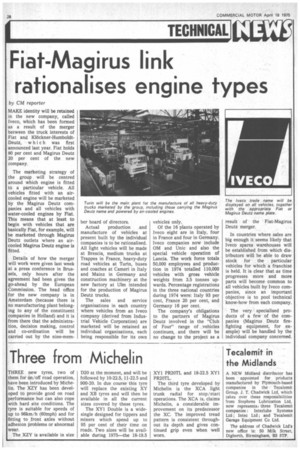Fiat-Magirus link rationalises engine types
Page 30

If you've noticed an error in this article please click here to report it so we can fix it.
by CM reporter MAKE identity will be retained in the new company, called Iveco, which has been formed as a result of the merger between the truck interests of Fiat and Klockner-HumboldtDeutz, which was first announced last year. Fiat holds 80 per cent and Magirus Deutz 20 per cent of the new company.
The marketing strategy of the group will be centred around which engine is fitted to a particular vehicle. All vehicles fitted with an aircooled engine will be marketed by the Magirus Deutz companies and all vehicles with water-cooled engines by Fiat. This means that at least to begin with vehicles that are basically Fiat, for example, will be marketed through Magirus Deutz outlets where an aircooled Magirus Deutz engine is fitted.
Details of how the merger will work were given last week at a press conference in Brussels, only hours after the agreement had been given the go-ahead by the European Commission. The head office for the new company is in Amsterdam (because there is no manufacturing plant belonging to any of the constituent companies in Holland) and it is from there that the administration, decision making, control and co-ordination will be carried out by the nine-mem her board of directors.
Actual production and manufacture of vehicles at present built by the individual companies is to be rationalised. All light vehicles will be made at Brescia, medium trucks at Trappes in France, heavy-duty road vehicles at Turin, buses and coaches at Cameri in Italy and Mainz in Germany and construction machinery at the new factory at Ulm intended for the production of Magirus Deutz trucks.
The sales and service organisations in each country where vehicles from an Iveco company (derived from Industrial Vehicle Corporation) are marketed will be retained as individual organisations, each being responsible for its own vehicles only.
Of the 16 plants operated by Iveco eight are in Italy, four in France and four in Germany. Iveco companies now include OM and Unic and also the special vehicle operation of Lancia. The work force totals 50,000 employees and production in 1974 totalled 110,000 vehicles with gross vehicle weights from 3.5 tonnes upwards. Percentage registrations in the three national countries during 1974 were: Italy 93 per cent, France 20 per cent, and Germany 16 per cent.
The company's obligations to the partners of Magirus Deutz involved in the "Club of Four" range of vehicles continues, and there will be no change to the project as a result of the Fiat-Magirus Deutz merger.
In countries where sales are big enough it seems likely that Iveco spares warehouses will be established from which distributors will be able to draw stock for the particular vehicles for which a franchise is held. It is clear that as time progresses more and more parts will become common to all vehicles built by Iveco companies, since an important objective is to pool technical know-how from each company.
The very specialised products of a few of the companies (Magirus Deutz firefighting equipment, for example) will be handled by the individual company concerned.








































































































































